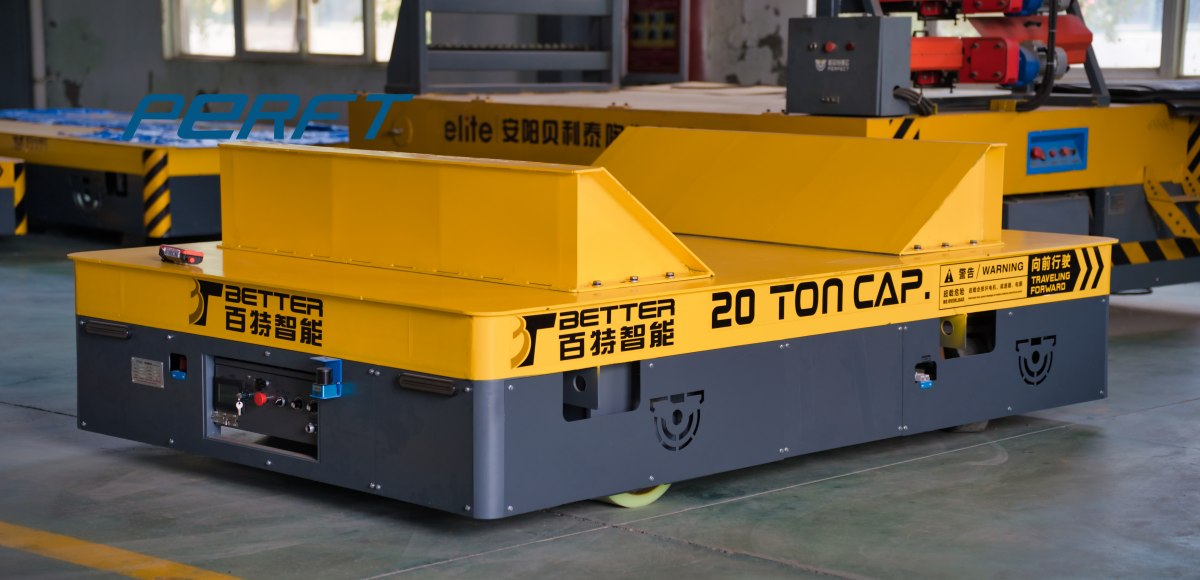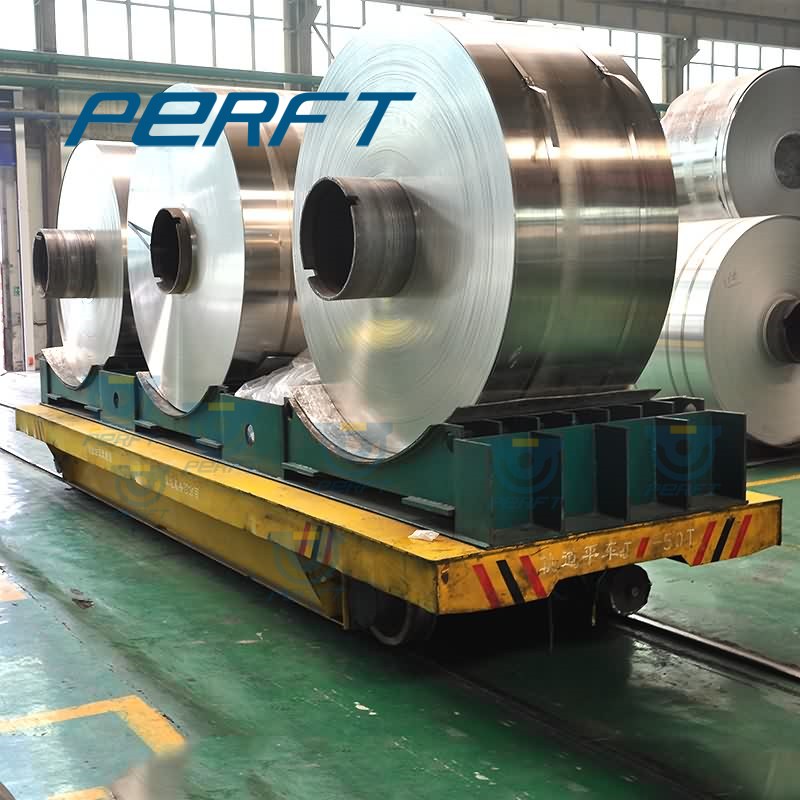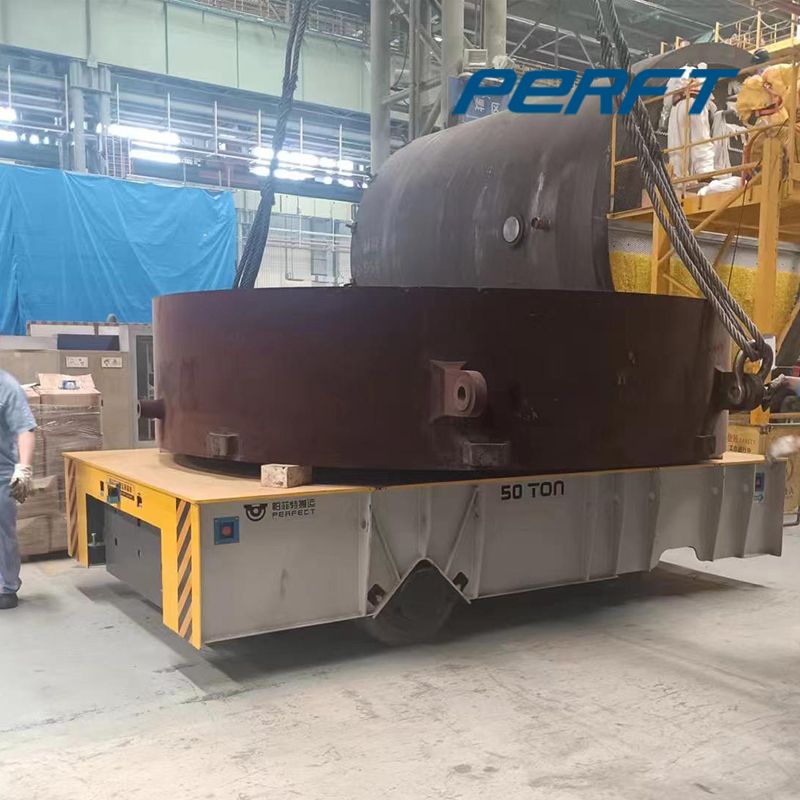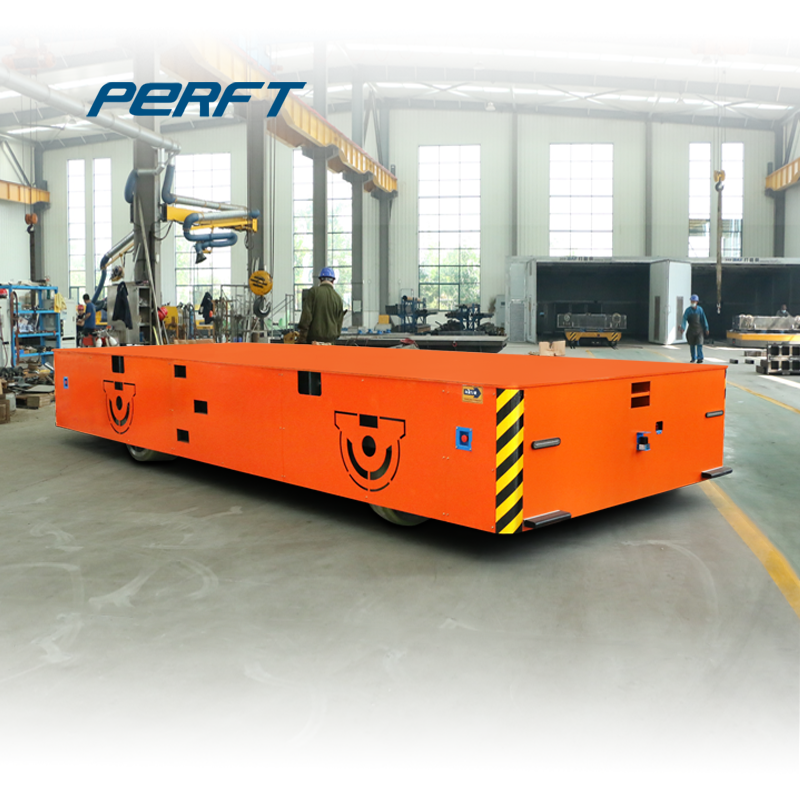3 Key Differences Electric Transfer Car vs Electric Forklift
Differences in Structure
Electric Transfer Car
Electric transfer car is usually a flatbed type of transfer equipment, and its main structure includes a frame, wheels, a driving device, and an electrical control system. The frame is generally a sturdy metal structure, providing a stable platform for carrying goods, and its shape is more regular and simple, usually a rectangular flat plate.
The number of wheels varies according to the size and carrying capacity of transfer car, and there are four wheels, six wheels, and other configurations.
The driving device can be a motor to drive the wheels through the reducer, and the electrical control system is used to control the start, stop, speed adjustment, and other functions of electric flat car.
Part of the electric flat car will also be equipped with a guardrail to prevent the goods from falling during transportation, but the overall structure is relatively open; there is no complex lifting structure like a forklift.
Electric Forklift
Electric forklift structure is relatively complex. It has main parts such as body, gantry, forks, driving wheels, and steering wheels. The body contains core components such as motor, battery, controller, etc., which provide power and control for the operation of the forklift.
The gantry is the key structure of the electric forklift, which controls the lifting of the forks through the hydraulic system and is able to lift the cargo to different heights. Forks are usually a pair of metal forks mounted at the front of the gantry, which are used to insert into the bottom of the cargo for forking.
The drive wheels are usually located at the rear of the vehicle and are responsible for driving the forklift, while the steering wheels are at the front of the vehicle to realize the steering operation of the forklift.
20 Ton Automatic Transfer Cart Video
Differences in Working Principle
Electric Transfer Car
The working principle of electric transfer cars is relatively straightforward. The wheels are driven to rotate by the motor, and the friction between the wheels and the ground is utilized to make electric flat car move forward or backward.
The electrical control system adjusts the speed and direction of the motor according to the operator’s instructions, thus controlling the running speed and traveling direction of electric transfer car.
Electric transfer car mainly transports goods on a flat surface, and the height of the goods basically remains unchanged during transportation.
Electric Forklift
Electric forklift relies on a motor to drive the vehicle to move, which is similar to the electric flatcar. However, it is also equipped with a hydraulic system. When the goods need to be lifted, the forklift’s hydraulic pump starts, delivering hydraulic oil to the hydraulic cylinder, pushing the piston to move, causing the gantry to rise, driving the forks and goods up.
When descending, the hydraulic oil returns, and under the synergistic effect of gravity and the hydraulic system, the forks and goods descend smoothly. The working process involves two main parts: mechanical movement and hydraulic transmission, which can realize the vertical handling of goods.

Differences in Applicable Scenes
Electric Transfer Car
Electric transfer cart is suitable for transporting large, heavy, and regular shaped goods on relatively flat ground, such as transporting large raw material steel plates, large molds, and so on in the factory workshop. Because its flat structure can provide a large carrying area, it is convenient to place the goods of a larger size.
At the same time, it is more suitable for scenarios where the transportation distance is longer and frequent loading and unloading, and lifting the height of the goods is not required. For example, it is used in warehouses for the flat transfer of goods between different storage areas, or in production lines for the transportation of semi-finished products from one station to another.
Electric Forklift
Electric forklift is mainly used for loading, unloading, and stacking operations of goods in a limited space. It can shuttle between shelves in a warehouse, lift goods from the ground to different heights on the shelves for storage, or remove goods from the shelves.
It is suitable for handling goods of various shapes and packaging forms, such as palletized goods and barrel goods. Especially in logistics warehouses, distribution centers, and other places where frequent loading, unloading, and stacking of goods is required, it plays an important role.
Back to List
-
 上午9:33C-Hooks and Coil Transfer Carts
上午9:33C-Hooks and Coil Transfer Carts -
 下午6:23Transfer Carts vs. Forklifts: Which is the Better Handling Equipment for You?
下午6:23Transfer Carts vs. Forklifts: Which is the Better Handling Equipment for You? -
 上午10:37Rail Transfer Cart Track Installation Requirements & Features
上午10:37Rail Transfer Cart Track Installation Requirements & Features -
上午9:41Electric Rail Transfer Carts: Types, Load Capacity & Selection Guide
-
 上午10:443 Key Differences Electric Transfer Car vs Electric Forklift
上午10:443 Key Differences Electric Transfer Car vs Electric Forklift

